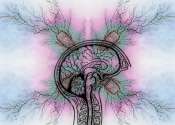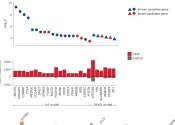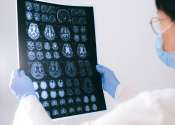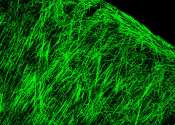Last update:
Neuroscience news
Neuroscience
Nerves prompt muscle to release factors that boost brain health, study finds
Exercise prompts muscles to release molecular cargo that boosts brain cell function and connection, but the process is not well understood. New research from the University of Illinois Urbana-Champaign has found that the ...
3 hours ago
0
24
Medical research
Study finds that the transport of mRNAs into axons along with lysosomal vesicles prevents axon degeneration
RNA granules, sites for the storage, transport, and regulation of RNA molecules within cells, are transported along axons and then translated locally, far from the cell body. Recent studies suggest that these granules can ...
8 hours ago
0
31
Using advanced genetic techniques, scientists create mice with traits of Tourette disorder
In research that may be a step forward toward finding personalized treatments for Tourette disorder, scientists at Rutgers University–New Brunswick have bred mice that exhibit some of the same behaviors and brain abnormalities ...
5 hours ago
0
21

Human 'neural compass' pinpointed in new study
A pattern of brain activity that helps prevent us from getting lost has been identified in a new study, published in Nature Human Behaviour.
9 hours ago
0
13

Red light therapy for repairing spinal cord injury passes milestone
Patients with spinal cord injury (SCI) could benefit from a future treatment to repair nerve connections using red and near-infrared light.
9 hours ago
0
51

Exploring how the human brain stores and preserves information
Research into how the human brain stores information could lead to treatments for people who struggle with everyday tasks.
2 hours ago
0
0

Researchers find B cells drive responses of other immune cells, can be modified to prevent multiple sclerosis symptoms
B cells can control responses of myeloid cells through the release of particular cytokines (small proteins that control the growth and activity of cells in the immune system), disproving the previous consensus that T cells ...
9 hours ago
0
3

New study reveals age-related brain changes influence recovery after stroke
A new study by a global team of researchers, led by Sook-Lei Liew, Ph.D., of USC's Mark and Mary Stevens Neuroimaging and Informatics Institute (Stevens INI), has revealed that areas of age-related damage in the brain relate ...
7 hours ago
0
1

Knocking out deadly brain cancer with a dual therapy
Glioblastoma is an often fatal form of brain cancer, with only 5% of patients surviving beyond five years. The cancer is difficult to treat and almost always becomes resistant to treatment. As a result, recurrence of glioblastoma ...
8 hours ago
0
0

Investigating how to prevent unwanted side effects of cancer treatment in children
As the numbers of pediatric brain cancer survivors continue improving, the numbers of individuals developing life-long neurocognitive impairments are consequently expected to rise.
5 hours ago
0
0

Multifrequency tympanometry could aid diagnosis of Meniere disease
Multifrequency tympanometry (MFT) could aid the diagnosis of Meniere disease (MD), according to a review published online March 4 in the Journal of Clinical Medicine.
4 hours ago
0
0

Some psychedelic drug users are stuck with unwelcome highs
A.J. took two small hits off a cannabis vape pen, a common ritual with his morning coffee. Moments after exhaling, a transfigured, kaleidoscopic version of the world emerged before his eyes.
11 hours ago
0
32

Researchers find unexpected link between essential fats and insulin aggregation
Scientists within Texas A&M AgriLife Research have discovered a surprising connection between certain fatty acids and insulin when mixed in solution. Their study, published in ACS Chemical Neuroscience, showed the presence ...
May 3, 2024
0
68

Genetics, not lack of oxygen, causes cerebral palsy in quarter of cases: Study
The world's largest study of cerebral palsy (CP) genetics has discovered genetic defects are most likely responsible for more than a quarter of cases in Chinese children, rather than a lack of oxygen at birth as previously ...
May 3, 2024
1
36

Birds overcome brain damage to sing again
Every year, more than 795,000 people experience a stroke, often resulting in brain damage that impairs their ability to speak, walk, or perform tasks. Fortunately, in many cases, these abilities can be regained through physical ...
May 3, 2024
0
32

The key role of Galectin-3 in brain tumor development
A research group at the Department of Biochemistry and Molecular Biology of the University of Seville has made a significant advance by discovering the crucial role of the protein Galectin-3 in the progression of various ...
May 3, 2024
0
12

Exploring how brain chemistry influences formation of political opinions
Researchers are exploring a new theory on how the chemistry of the brain causes people to form political opinions. James Cook University neuroscientist Professor Zoltan Sarnyai was part of an international team exploring ...
May 3, 2024
0
15

How music affects the cognitive health of older adults
Listening to music benefits older adults' cognitive health, even if it's music they haven't heard before or don't enjoy very much, according to a study by Simon Fraser University and Health Research BC researchers.
May 3, 2024
0
1

Multicomponent intravenous lipid emulsion found to improve brain development in preterm infants
Preterm infants supported with a multicomponent intravenous lipid emulsion saw improved brain development compared to those given a single-fat source, a new study finds. The research will be presented at the Pediatric Academic ...
May 3, 2024
0
0

Small molecule shows early-stage promise for repairing myelin sheath damage
When treated with a novel protein function inhibitor called ESI1, mice that mimic the symptoms of multiple sclerosis (MS) and lab-prepared human brain cells both demonstrated the ability to regenerate vital myelin coatings ...
May 2, 2024
0
47




















